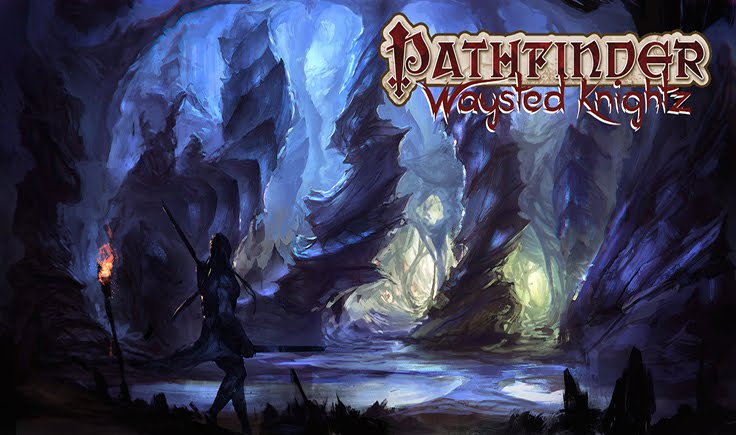Classes: You'll begin play as
commoners, per pages 449-450 of the
Core Rulebook, a class which is normally reserved only for NPCs but suits the low power level and 'rags to riches' aesthetic of this campaign. In short, this grants an initial +0 BAB, +0 to all Base Saving Throws, a d6 for Hit Dice, and the following Class Skills: Climb (Str), Craft (Int), Handle Animal (Cha), Perception (Wis), Profession (Wis), Ride (Dex), and Swim (Str). Skill Ranks per level are 2+ Int modifier. You will begin with proficiency in a single simple weapon of your choice, or you can choose proficiency with the light pick instead (a martial weapon). You begin play with such a light pick, an explorer's outfit, and 5d4 gp to spend as you see fit on weapons and equipment from the
Core Rulebook. Other classes will become 'unlocked' as the players gain levels.
Races: PCs can be built from the
human, halfling or
dwarf races in the
Core Rulebook, or the
oread from the
Advanced Race Guide. There will be a restriction of one oread, and two non-human PCs overall to reflect the demographics of the labor commune they originate from.
Ability Scores: You'll be using the Point Purchase system as per pages 15-16 of the Core Rulebook, set at the Low Fantasy setting with 10 points to spend. Remember that you can drop base abilities below 10 to receive extra points for use elsewhere.
Alignment: All alignments will be permitted apart from Chaotic and Lawful Evil, which will prove too meddlesome within the parameters of this campaign.
Levels: Characters will be required to take at least three levels in commoner before multi-classing off to another specialty, and thus PCs entering at higher level must also fill this requirement. PCs joining later will begin at one character level below the average (which will be tracked here on the blog).
Wealth: 1st level commoners receive 5d4 starting wealth with which to purchase goods from the Core Rulebook. PCs starting at higher character levels will use the NPC Gear Table 14-9 from the Core Rulebook, using the 'Basic Level' column, to organize their starting gear.
Naming Conventions: The Ekrysian Empire is loosely based on Greco-Roman culture and customs, and these humans derive their naming traditions largely from an amalgam of ancient Hellenic and Roman traditions. Provided here are several samples you can use as guidelines.
Ekrysian Male: Aegisthes, Antipho, Crethean, Evandros, Isokrates, Kerkyon, Megistas, Mnester, Nikeros, Periphas, Prokleon, Scythas, Simonax, Theomon, Tychae.
Ekrysian Female: Atalanta, Chryse, Eudokia, Hecuba, Hellanike, Iola, Iomene, Oenone, Phaedra, Polydamna, Stratonice, Thalassa, Thetis, Tryphene, Zenobya.
Ekrysian Surnames: Audens, Eclectus, Festus, Flavina, Galvas, Lucan, Malcha, Marinas, Nazaria, Synistor, Tantalos, Tiburs, Triaria, Vestorea, Vio.
Within the lower rungs of the social order, such as laborers, commoners, farmers, and mercenaries, nicknames are often adopted and used with priority over the given name. These will often feature a phonetic or alliterative similarity, but will be objects, verbs and adjectives rather than just a shortened name. A Diophantus might be dubbed 'Diamond', an 'Eucarpia' might be called 'Carp', an 'Euripides' could be 'Ripper', and so forth. This is not at all a requirement, but quite common.
Dwarves and halflings retain the more common naming conventions more typical in fantasy, as they are usually only a few generations at most removed from their nearby civilizations of Bazalt and Ambruz. Both might also prefer to use nicknames similar to the lower caste Ekrysians.
Dwarven Male: Gurd Greytoe, Handel Beastbraid, Umnar Kragsword, Yorn Forgeheart.
Dwarven Female: Bratra Kegbellows, Coin Cragwalker, Nozna Bronzeleg, Wilna Orebrow.
Halfling Male: Abba Gamut, Gerold Grubb, Olo Longfoot, Samson Riverhair,
Halfling Female: Jemmi Barrows, Pansy Daggit, Ruby Rumblehill, Yolanda Dirtwort.
Oreads use given names comparable to their Ekrysian kinfolk, but often include harsher or 'rockier' consonants that reflect their elemental nature. Some will have one or two human parents, perhaps even a dwarven parent, and their oread traits are inherited from previous generations.
Oread Male: Kyrillos, Pallaz, Stratiar, Teukros.
Oread Female: Aeroppe, Hekke, Khloris, Orithya.
Traits: You can choose two Basic or Racial traits for your character, as per the Advanced Player's Guide or any other official source book. You can also take Regional traits which belong to the 'desert' or 'mountain' classification.
Favored Class: A character's commoner levels will not count as his/her favored class unless he or she so chooses, so you can ignore the favored class leveling bonuses until you've selected your first 'real' character class, after which point they function as normal.


